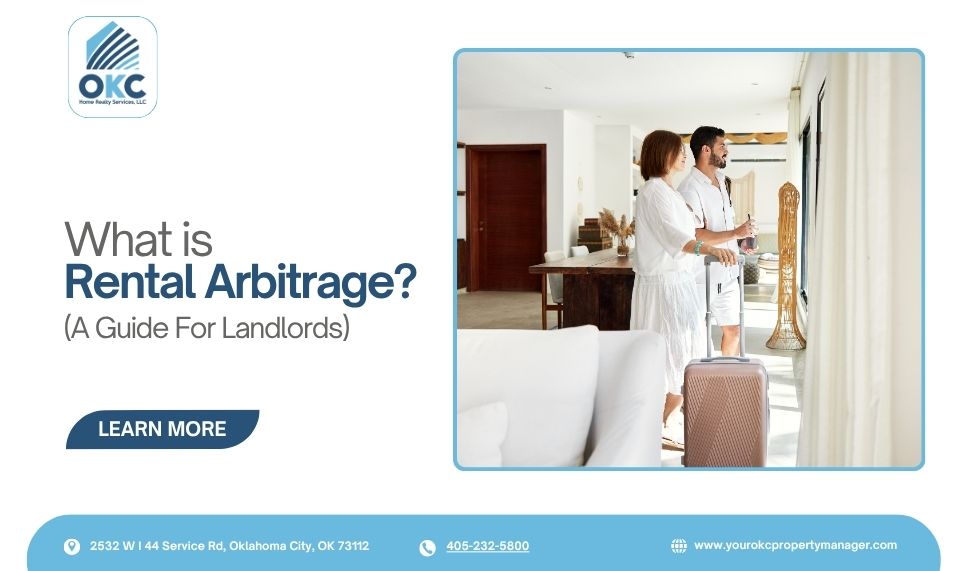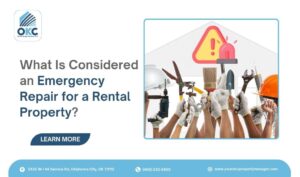Across the U.S., a growing number of investors are earning steady income from properties they don’t even own, and Oklahoma is catching on fast. According to AirDNA, short-term rental demand in Oklahoma City grew by over 20% in the past year, fueled by travelers, business stays, and temporary workers. This rise has opened the door for a creative strategy known as rental arbitrage.
Rental arbitrage lets you lease a property long-term and re-rent it short-term, usually through platforms like Airbnb or Vrbo, to pocket the difference as profit. It gives you a low-cost way to enter the rental market without buying property, taking on a mortgage, or dealing with high entry costs.
Having experience in managing rental properties for over 15 years across Oklahoma City and nearby metro areas. I’ve seen how this rental arbitrage is rapidly thriving. In this blog, I’ll break down how rental arbitrage works, the laws and tax rules you need to know (especially in Oklahoma), and the pros and cons of starting one. Whether you’re a property owner wondering if you should allow it or an investor searching for your next opportunity, you’ll get a clear, data-backed look at how this strategy fits into today’s housing market and whether it’s worth your investment.
Key Takeaways:
- Rental arbitrage lets you earn a profit by leasing long-term and renting short-term without owning property.
- High-demand locations in Oklahoma City and Tulsa maximize occupancy and profit.
- Startup costs for a one-bedroom property typically range from $5,000–$10,000.
- Average Oklahoma City rental arbitrage profit is $800–$1,500 per month per property.
- Landlord permission and city STR permits are mandatory to operate legally.
- Success depends on active guest management, cleaning, and hospitality efforts.
- Scaling is possible by adding more units and optimizing listings.
- Risks include legal issues, property damage, seasonal demand changes, and no equity growth.
- Insurance and clear agreements help mitigate financial and legal risks.
- Rental arbitrage is better suited for investors seeking cash flow, not long-term passive income.
What Is Rental Arbitrage?
Rental arbitrage is a real estate business model where you rent a property long-term, then sublet it short-term (usually on platforms like Airbnb or VRBO) to earn a profit
Here’s the basic idea:
- You rent an apartment or house for $1,200 per month.
- You furnish it nicely and list it on Airbnb.
- Guests book it for $150 per night, and you keep the profit after rent and expenses.
It’s sometimes called the “rent-to-rent” or Airbnb arbitrage model. You don’t need to own property, you simply control it through a lease and profit from the difference between what you pay and what guests pay.
How Rental Arbitrage Works (Step-by-step)
Let’s make it simple with an example.
Imagine you lease a one-bedroom apartment in Oklahoma City for $1,200/month. You spend $2,000 to furnish it and list it on Airbnb.
If the unit books 20 nights per nights month at $140/night, that’s $2,800 in gross revenue.
After deducting:
- Rent: $1,200
- Utilities & WI-FI: $200
- Cleaning: $150
- Airbnb fee: $150
You are left with about $1,300 profit per month.
Here’s the process step-by-step:
- Find a good rental in a high-demand area {near downtown OKC, hospitals, or attractions).
- Negotiate with the landlord for permission to sublet or operate short-term rentals.
- Furnish and decorate the property attractively.
- List it online using Airbnb, Booking.com, or VRBO.
- Manage bookings and guests or hire a property management company.
- Track your earnings and optimize your pricing using tools like PriceLabs or Wheelhouse.
If done right, rental arbitrage can generate steady cash flow without owning a single property.
Is Rental Arbitrage Legal?
The short answer: It depends on your lease and local laws.
Rental arbitrage is completely legal if:
- Your lease allows subleasing or short-term rentals, and
- You comply with city and state regulations.
In Oklahoma:
- Landlord permission is mandatory. You can’t sublease or host short-term guests without it.
- Short-term rentals are regulated by cities like Oklahoma City and Tulsa. For example, OKC requires STR registration, permits, and local taxes.
- HOAs or apartment complexes may have additional restrictions.
Pro Tip:
- Always get written consent from your landlord. Include terms like insurance coverage, cleaning responsibilities, and guest policies. It protects both parties.
- Failing to follow legal requirements can lead to eviction, fines, or loss of your listing.
Rental Arbitrage vs. Buying Property: Which is Better?
Here’s how rental arbitrage stacks up against traditional property investing:
| Factor | Rental Arbitrage | Owning a Property |
| Startup Cost | Low (lease + furniture) | High (down payment, closing costs) |
| Risk Level | Moderate (lease-based) | Higher (market-based) |
| Control | Limited | Full |
| Equity Growth | None | Yes |
| Monthly Cash Flow | Faster | Slower but long-term |
| Exit Flexibility | Easy | Harder to sell or exit |
Rental arbitrage is great for those who want quick cash flow and flexibility without buying.
Property ownership, however, builds wealth and equity over time. Many investors actually start with rental arbitrage to learn the ropes, then use profits to buy their first property later.
Startup Costs You Should Expect
Even though you don’t buy property, rental arbitrage still requires some setup costs. Here’s what to expect:
| Expense | Estimated Cost |
| First month’s rent + deposit | $2,000-$3,000 |
| Furniture and decor | $2,000-$5,000 |
| Utilities & Wi-Fi setup | $200-$400 |
| Cleaning supplies/equipment | $150-$300 |
| Airbnb setup & photography | $200-$500 |
| Business license or STR permit | $100-$300 |
| Insurance | $20-$50/month |
Total Startup: around $5,000-$10,000 for a basic one-bedroom setup.
Compared to buying a home (which may need $30,000 + upfront), this model is very much more affordable.
How Much Can You Make With Rental Arbitrage?
Your income depends on the location, season, and occupancy rate.
Example: Oklahoma City
According to AirDNA, the average nightly rate for short-term rentals in OKC is around $130–$150, with an occupancy rate between 65% and 70%.
That means:
Monthly income ≈ $2,500–$3,000
After rent and expenses, profit ≈ $800–$1,500/month per property
In tourist-heavy cities (like Austin or Nashville), profits can be higher.
But even in affordable markets like Oklahoma, the model can deliver 20–30% ROI annually if managed efficiently.
Tip: Optimize listings with professional photos and respond quickly to guest messages; hosts with better reviews earn 30% higher occupancy rates.
Pros and Cons of Rental Arbitrage
Every business model has trade-offs. Here’s what to expect:
Pros
- Low entry cost: You don’t need to buy property.
- Quick cash flow: Start earning within weeks.
- Scalable model: Add more units easily once profitable.
- No mortgage or property tax.
- Flexible locations: You can test new cities without long-term commitment.
Cons
- Legal gray areas: Must ensure compliance with local laws.
- Landlord dependence: Permission required for every property.
- High workload: Guest turnover, cleaning, and communication.
- Market volatility: Airbnb demand can fluctuate seasonally.
- No asset ownership: You’re building income, not equity.
Bottom line: Rental arbitrage can be a profitable short-term strategy, but it’s not truly passive. You’re essentially running a hospitality business.
How to Start a Rental Arbitrage Business (Step-by-Step)
Ready to give it a try? Here’s a simple roadmap:
1. Research Your Market
Look for cities with strong tourism, hospitals, or corporate travel.
For example:
Oklahoma City: steady year-round demand from business travelers and families.
Tulsa: growing Airbnb interest near downtown and Cherry Street.
Use AirDNA or Mashvisor to compare average rates and occupancy.
2. Check Local Laws
Before signing any lease, review your city’s short-term rental regulations.
In OKC, hosts must:
- Obtain a Short-Term Rental License,
- Pay lodging taxes, and
- Display their permit number in listings.
Fines for ignoring these rules can reach $500 per violation.
3. Get Landlord Permission
This is the make-or-break step.
Be honest. Explain your plan and show how it benefits them:
- Guaranteed rent every month.
- Professional cleaning after each stay.
- Higher security deposit or additional insurance.
Offer to sign an addendum stating responsibilities clearly.
4. Furnish the Property Smartly
You don’t need luxury, just comfort and consistency.
Focus on:
- Comfortable beds and clean linens.
- Reliable Wi-Fi and smart TV.
- A fully stocked kitchen.
- Keyless entry for self-check-in.
Design can make a big difference. Listings with professional photos get up to 40% more bookings.
5. Create a Professional Listing
On Airbnb, great listings stand out.
Include:
- A catchy title (“Modern Downtown OKC Apartment, Walk to Bricktown!”)
- 15–20 high-quality photos.
- A warm, conversational description.
- Clear house rules and amenities list.
Use dynamic pricing tools like Wheelhouse or Beyond Pricing to stay competitive.
6. Manage Like a Pro
Guest experience drives reviews, and reviews drive profit.
- Respond to messages within an hour.
- Keep the property spotless.
- Offer local touches like coffee or city guides.
If managing is too time-consuming, hire a local property management company that specializes in short-term rentals.
7. Scale Your Portfolio
Once you’re consistently profitable, replicate the model:
- Add 1–2 more units in the same city.
- Use profits to fund new furniture or deposits.
- Track all expenses for tax deductions.
Some successful operators run 5–10 units full-time and generate over $10,000/month in net income.
Common Mistakes to Avoid
- Skipping landlord approval: This can get you evicted quickly.
- Ignoring city laws: Fines and bans are expensive.
- Underestimating setup costs: Quality furnishings matter.
- Choosing poor locations: If the area lacks demand, you’ll struggle to fill nights.
- Not having insurance: Standard renter’s insurance doesn’t cover guest stays.
- Neglecting maintenance: Small issues (like leaks or HVAC problems) can ruin reviews.
Plan carefully, document everything, and treat it like a business.
Is Rental Arbitrage Worth It in 2025 and Beyond?
The short-term rental market is evolving fast.
Here’s what’s happening in 2025:
- Airbnb demand remains strong in mid-sized U.S. cities (like Oklahoma City, Kansas City, and Raleigh).
- Occupancy rates have stabilized after the pandemic boom, averaging 60–70% nationally.
- New local regulations mean compliance is more important than ever
In Oklahoma, affordability gives rental arbitrage an edge, lower rents mean better margins. But success now depends more on professional management than luck.
So, is it worth it?
- Yes, if you follow the rules, manage responsibly, and choose the right location.
- No, if you expect passive income without effort.
Rental arbitrage rewards those who treat it like a hospitality business, not a hobby.
Final Thoughts: Is Rental Arbitrage Right for You?
Rental arbitrage can be a profitable, flexible way to earn income in real estate without owning property.
It’s ideal for:
- Entrepreneurs testing new markets.
- Tenants who want to earn extra income (with permission).
- Investors seeking quick cash flow before buying property.
However, it’s not for everyone.
You’ll need time, capital, and solid communication with landlords. You’ll also need to stay compliant with local rules and maintain great guest experiences.
If you’re in Oklahoma City or nearby, rental arbitrage can still be a smart move, especially when guided by an experienced property management partner. At OKC Home Realty Services, we know the market, pricing trends, and compliance requirements.
Rental Arbitrage FAQs
1: Is rental arbitrage legal in Oklahoma?
Yes, but only if you have landlord consent and follow local STR laws in Oklahoma City or Tulsa. You’ll need a permit and must collect local taxes.
2: How much money can you make?
Many hosts earn $800–$1,500 per month per property after expenses, depending on occupancy and management quality.
Do I need a real estate license?
No. You only need a lease agreement allowing subletting and compliance with city regulations.
What are the biggest risks of rental arbitrage?
Legal issues, property damage, poor guest reviews, and fluctuating demand. Always protect yourself with insurance and clear agreements.
What is the difference between rental arbitrage and subletting?
While rental arbitrage and subletting may look similar on the surface, but the two are quite different in purpose and scale. For example, Rental arbitrage is a business strategy where someone leases a property long-term and rents it out short-term for profit, while subletting is typically a tenant temporarily renting their space to cover rent, not to make money.
: Is rental arbitrage profitable?
Yes, rental arbitrage can be profitable if done in high-demand areas, managed efficiently, and operated legally with potential for margins of 15-35% or more, but success depends on factors like location, occupancy rates, rental costs, and local short-term rental regulations.
How to find rental arbitrage properties?
You can find rental arbitrage properties by looking for high-demand short-term rental areas on platforms like Airbnb or Zillow, analyzing rental and occupancy data with tools like AirDNA, and reaching out to landlords open to subleasing or corporate leases for short-term rental use.

Author
Scott Nachatilo is an investor, property manager and owner of OKC Home Realty Services – one of the best property management companies in Oklahoma City. His mission is to help landlords and real estate investors to manage their property in Oklahoma.
 (
(









